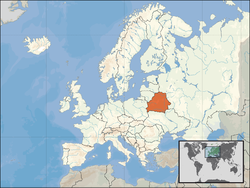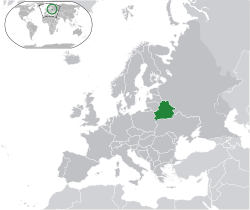
Back بوابة:بيلاروس Arabic Portal:Belarus Azerbaijani Партал:Беларусь Byelorussian Партал:Беларусь BE-X-OLD دەروازە:بیلاڕووس CKB Portál:Bělorusko Czech Portal:Belarus German Portal:Bielorrusia Spanish Portail:Biélorussie French Portale:Bielorussia Italian
| Welcome to the Belarus Portal
|
Сардэчна запрашаем да беларускага партала!
 |
 |

| |
Belarus, officially the Republic of Belarus, is a landlocked country in Eastern Europe. It is bordered by Russia to the east and northeast, Ukraine to the south, Poland to the west, and Lithuania and Latvia to the northwest. Belarus spans an area of 207,600 square kilometres (80,200 sq mi) with a population of 9.1 million. The country has a hemiboreal climate and is administratively divided into six regions. Minsk is the capital and largest city; it is administered separately as a city with special status.
Between the medieval period and the 20th century, different states at various times controlled the lands of modern-day Belarus, including Kievan Rus', the Principality of Polotsk, the Grand Duchy of Lithuania, the Polish–Lithuanian Commonwealth, and the Russian Empire. In the aftermath of the Russian Revolution in 1917, different states arose competing for legitimacy amid the Civil War, ultimately ending in the rise of the Byelorussian SSR, which became a founding constituent republic of the Soviet Union in 1922. After the Polish-Soviet War (1918–1921), Belarus lost almost half of its territory to Poland. Much of the borders of Belarus took their modern shape in 1939, when some lands of the Second Polish Republic were reintegrated into it after the Soviet invasion of Poland, and were finalized after World War II. During World War II, military operations devastated Belarus, which lost about a quarter of its population and half of its economic resources. In 1945, the Byelorussian SSR became a founding member of the United Nations and the Soviet Union. The republic was home to a widespread and diverse anti-Nazi insurgent movement which dominated politics until well into the 1970s, overseeing Belarus's transformation from an agrarian to an industrial economy.
The parliament of the republic proclaimed the sovereignty of Belarus on 27 July 1990, and during the dissolution of the Soviet Union, Belarus gained independence on 25 August 1991. Following the adoption of a new constitution in 1994, Alexander Lukashenko was elected Belarus's first president in the country's first and only free election after independence, serving as president ever since. Lukashenko heads a highly centralized authoritarian government. Belarus ranks low in international measurements of freedom of the press and civil liberties. It has continued several Soviet-era policies, such as state ownership of large sections of the economy. Belarus is the only European country that continues to use capital punishment. In 2000, Belarus and Russia signed a treaty for greater cooperation, forming the Union State. (Full article...)
Selected article

Lesbian, gay, bisexual, transgender, and queer (LGBTQ) people in Belarus face severe challenges not experienced by non-LGBTQ residents. Although same-sex sexual activity is legal in Belarus, gay and lesbian rights in the country are otherwise severely limited and homosexuality remains highly stigmatized in Belarusian society. Households headed by same-sex couples are not eligible for the same legal protections available to opposite-sex couples. Belarus provides no anti-discrimination protections for LGBTQ people, nor does it prohibit hate crimes based on sexual orientation and gender identity. Many Belarusian people believe that homosexuality is a psychiatric illness, and many LGBTQ persons in Belarus tend to hide their sexual orientation in public. Those who are "out" face harassment, violence and physical abuse. (Full article...)
Selected biography
Alexander Grigoryevich Lukashenko (also transliterated as Alyaksandr Ryhoravich Lukashenka; born 30 August 1954) is a Belarusian politician who has been the first and only president of Belarus since the office's establishment in 1994, making him the current longest-serving European leader.
Before embarking on his political career, Lukashenko worked as the director of a state farm (sovkhoz) and served in both the Soviet Border Troops and the Soviet Army. In 1990, Lukashenko was elected to the Supreme Soviet of the Byelorussian Soviet Socialist Republic. Following the dissolution of the Soviet Union, he assumed the position of head of the interim anti-corruption committee of the Supreme Council of Belarus. In 1994, he won the presidency in the country's inaugural presidential election after the adoption of a new constitution. (Full article...)
General images
Selected picture
Did you know (auto-generated)

- ... that Rufina Bazlova has used traditional embroidery to depict protests in Belarus?
- ... that German national Rico Krieger was likely forced by the Belarusian KGB to lie in a state-televised plea titled "Confession of a German Terrorist"?
- ... that Obliskomzap People's Commissar for Public Charity V. L. Mukha resigned in protest over the dispersing of the First All-Belarusian Congress?
- ... that there are more than 9,000 swamps in Belarus?
- ... that the Russian and Belarusian military exercise Zapad 2013 was officially described as counterterrorist, but international observers concluded that it was a preparation for a conventional war?
- ... that the Russian and Belarussian military exercise Zapad 2009 involved nuclear-capable ballistic missiles?
Featured articles
Related portals
Post Soviet states
Other countries
More Did you know
- ...that Belarus Free Theatre is an underground theatre project created to oppose Belarusian government pressure and censorship?
Topics
Subcategories
New article announcements
This page was created using Portal:Belarus/New article announcements. It is created for everyone interested in Belarus-related articles to notice everything new.
Urgent announcements
- NONE
This list was generated from these rules. Questions and feedback are always welcome! The search is being run daily with the most recent ~14 days of results. Note: Some articles may not be relevant to this project.
Rules | Match log | Results page (for watching) | Last updated: 2025-03-30 19:46 (UTC)
Note: The list display can now be customized by each user. See List display personalization for details.
- 2025–26 UEFA Conference League qualifying phase and play-off round (edit | talk | history | links | watch | logs | tools) by Stevie fae Scotland (talk · contribs · new pages (8)) started on 2025-03-30, score: 20
- Anisim (edit | talk | history | links | watch | logs | tools) by Altenmann (talk · contribs · new pages (104)) started on 2025-03-29, score: 20
- Plavni, Kaliningrad Oblast (edit | talk | history | links | watch | logs | tools) by Marcin 303 (talk · contribs · new pages (28)) started on 2025-03-29, score: 20
- Karamyshevo, Kaliningrad Oblast (edit | talk | history | links | watch | logs | tools) by Marcin 303 (talk · contribs · new pages (28)) started on 2025-03-29, score: 20
- 2025 Belarusian First League (edit | talk | history | links | watch | logs | tools) by BlameRuiner (talk · contribs · new pages (1)) started on 2025-03-28, score: 100
- Statue of Vytautas the Great (edit | talk | history | links | watch | logs | tools) by Boubloub (talk · contribs · new pages (11)) started on 2025-03-27, score: 40
- Permanent Representative of Sweden to the Organization for Security and Co-operation in Europe (edit | talk | history | links | watch | logs | tools) by Saftgurka (talk · contribs · new pages (11)) started on 2025-03-26, score: 20
- Monastery of the Dormition of the Mother of God, Zabłudów (edit | talk | history | links | watch | logs | tools) by Oliwiasocz (talk · contribs · new pages (59)) started on 2025-03-24, score: 62
- Ignazio Ceffalia (edit | talk | history | links | watch | logs | tools) by Roberto221 (talk · contribs · new pages (2)) started on 2025-03-25, score: 20
- Nicol Voronkov (edit | talk | history | links | watch | logs | tools) by Maniakilljoy97 (talk · contribs · new pages (5)) started on 2025-03-25, score: 20
- 2024 Belarusian municipal elections (edit | talk | history | links | watch | logs | tools) by Rakoon (talk · contribs · new pages (31)) started on 2025-03-25, score: 30
- Daniel Kurganov (edit | talk | history | links | watch | logs | tools) by Delgesu1986 (talk · contribs · new pages (2)) started on 2025-03-16, score: 40
- Karolina Borchardt (edit | talk | history | links | watch | logs | tools) by Nayyn (talk · contribs · new pages (24)) started on 2025-03-24, score: 20
- Kursk offensive (2024–2025) (edit | talk | history | links | watch | logs | tools) by WikiCleanerMan (talk · contribs · new pages (11)) started on 2025-03-24, score: 20
- 2002–03 UEFA Women's Cup qualifying round (edit | talk | history | links | watch | logs | tools) by Adam Salter (talk · contribs · new pages (13)) started on 2025-03-23, score: 20
- 2003–04 UEFA Women's Cup qualifying round (edit | talk | history | links | watch | logs | tools) by Adam Salter (talk · contribs · new pages (13)) started on 2025-03-23, score: 20
- Julian Brun (edit | talk | history | links | watch | logs | tools) by Rahammz (talk · contribs · new pages (2)) started on 2025-03-20, score: 20
- 157th Rifle Division (edit | talk | history | links | watch | logs | tools) by Wreck Smurfy (talk · contribs · new pages (1)) started on 2025-03-23, score: 20
- Chief of the Joint Staff of the Collective Security Treaty Organization (edit | talk | history | links | watch | logs | tools) by Romanov loyalist (talk · contribs · new pages (10)) started on 2025-03-21, score: 20
- Katherina Yevzerov (edit | talk | history | links | watch | logs | tools) by Grnrchst (talk · contribs · new pages (25)) started on 2025-03-22, score: 20
- Church of the Intercession of the Theotokos, Czarna Cerkiewna (edit | talk | history | links | watch | logs | tools) by Oliwiasocz (talk · contribs · new pages (59)) started on 2025-03-20, score: 22
- Unified Gas Supply System (edit | talk | history | links | watch | logs | tools) by Rakoon (talk · contribs · new pages (31)) started on 2025-03-21, score: 20
- Chief of the Joint Staff of the CSTO (edit | talk | history | links | watch | logs | tools) by Romanov loyalist (talk · contribs · new pages (10)) started on 2025-03-21, score: 20
- Sesha Sindhu Rao (edit | talk | history | links | watch | logs | tools) by Chakrabartyprateek14 (talk · contribs · new pages (1)) started on 2025-03-21, score: 20
- Suspicious Russia-related deaths since 2022 (edit | talk | history | links | watch | logs | tools) by Amakuru (talk · contribs · new pages (41)) started on 2025-03-16, score: 20
- Stanislav Lapkes (edit | talk | history | links | watch | logs | tools) by Gri3720 (talk · contribs · new pages (2)) started on 2025-03-20, score: 60
- Cartoon Network (Central and Eastern Europe) (edit | talk | history | links | watch | logs | tools) by Paine Ellsworth (talk · contribs · new pages (18)) started on 2025-03-20, score: 20
- Aleksandr Boroda (edit | talk | history | links | watch | logs | tools) by Rakoon (talk · contribs · new pages (31)) started on 2025-03-20, score: 20
- Church of St. Demetrius, Żerczyce (edit | talk | history | links | watch | logs | tools) by Oliwiasocz (talk · contribs · new pages (59)) started on 2025-03-20, score: 32
- Siuzanna Valodzka (edit | talk | history | links | watch | logs | tools) by Gamerspats (talk · contribs · new pages (2)) started on 2025-03-19, score: 20
- Tsepenkov (edit | talk | history | links | watch | logs | tools) by Faldi00 (talk · contribs · new pages (14)) started on 2025-03-19, score: 60
- Begunov (edit | talk | history | links | watch | logs | tools) by Faldi00 (talk · contribs · new pages (14)) started on 2025-03-19, score: 60
- Andrei Ishutin (edit | talk | history | links | watch | logs | tools) by Mish-FCTM (talk · contribs · new pages (3)) started on 2025-03-17, score: 46
- Minsker (edit | talk | history | links | watch | logs | tools) by David Eppstein (talk · contribs · new pages (30)) started on 2025-03-17, score: 40
- List of military aircraft mechanical systems in production and in development by the European defence industry (edit | talk | history | links | watch | logs | tools) by Fabrice Ram (talk · contribs · new pages (2)) started on 2025-03-17, score: 20
- List of international trips made by Muammar Gaddafi (edit | talk | history | links | watch | logs | tools) by Khamees99 (talk · contribs · new pages (2)) started on 2025-03-16, score: 30
- Capture of Warsaw (1657) (edit | talk | history | links | watch | logs | tools) by StephanSnow (talk · contribs · new pages (3)) started on 2025-03-16, score: 22
Associated Wikimedia
The following Wikimedia Foundation sister projects provide more on this subject:
-
Commons
Free media repository -
Wikibooks
Free textbooks and manuals -
Wikidata
Free knowledge base -
Wikinews
Free-content news -
Wikiquote
Collection of quotations -
Wikisource
Free-content library -
Wikiversity
Free learning tools -
Wikivoyage
Free travel guide -
Wiktionary
Dictionary and thesaurus
Sources
- ^ Kopka, D. (2011). Welcome to Belarus: Passport to Eastern Europe & Russia. Passport Series. Milliken Publishing Company. p. 6. ISBN 978-0-7877-2770-3. Retrieved July 28, 2019.
- ^ Harshav, Benjamin. Marc Chagall and his times: a documentary narrative. Contraversions: Jews and Other Differences. Stanford University Press; 1 edition. August 2003. ISBN 0804742146.





































![Image 2The Fiddler, 1912–1913, by Marc Chagall, a Russian-French artist of Belarusian Jewish origin[2]](http://upload.wikimedia.org/wikipedia/en/thumb/4/4a/Image-Chagall_Fiddler.jpg/101px-Image-Chagall_Fiddler.jpg)


![Image 5White storks on their nest in Belarus, 2009. The Stork is the national symbol of Belarus.[1]](http://upload.wikimedia.org/wikipedia/commons/thumb/4/41/BY_stork1_2009.jpg/120px-BY_stork1_2009.jpg)
































